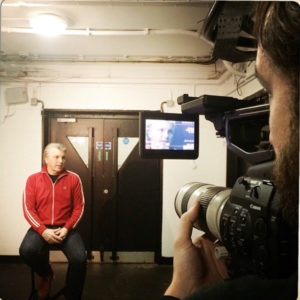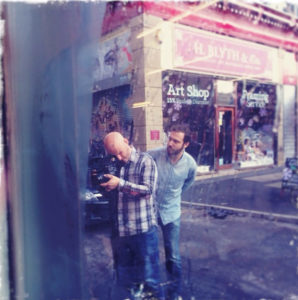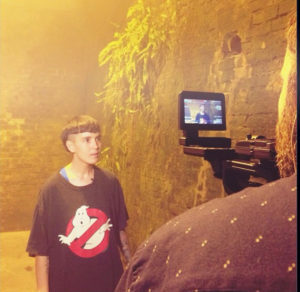Directed and produced by Zaragoza native Javier Senz, ‘Manchester Keeps On Dancing’ is a documentary that takes a look at how house music got started in the city of Manchester during the 1980s. It serves as a reminder of just how important this city was as the first music scene in Europe to import house music from the north-eastern United States, before going on to expand this brand-new genre. The story is told by the DJs themselves, not to mention the managers of nightclubs like The Haçienda, which were responsible for taking house music to the heights it reached. It also features names from today’s scene, who are keeping the spirit of house music alive.
Mike Pickering: “Finally, a documentary that reflects the soul of Manchester”
We got the chance to interview the creator of this musical documentary, Javier Senz, a Spaniard who loves clubbing and house music – “one of the great genres of electronic music, with so much soul” – who lived in Manchester between 2013 and 2016 for work. When he arrived, he found himself in a city which, unbeknownst to him, would bring him so much more than what he originally went there for. After 11 years working with musicians for MTV, he moved to this small industrial city in the north of England, which describes itself with three words: “football, music and beer’. Three concepts that are as key to the local character as they would end up being to Javier’s own experiences as television director of Manchester City Football Club.

Interviewing Greg Wilson during filming for ‘Manchester Keeps on Dancing’
What was it like living in Manchester, and what makes it stand out as an English city of music?
Although I love London, I would sooner choose Manchester to live in. Since it’s a small city, it’s easy to get around, and the people are just so lovely. People from the north are way more open to making new friends and it’s actually full of people from all over the place. Also, Manchester is a much bigger deal, musically speaking. It’s produced some massive artists, like Oasis, New Order, Joy Division, The Bee Gees, The Stone Roses and even Take That – it’s not just house music. You’d be surprised just how many artists are from Manchester.
All these people would hang out together in The Haçienda. The Stone Roses, for example, who liked rock music, started to listen to this electronic music there, and that is what made them create that more “dancey” style of rock. House music has been hugely influencial. That’s what makes Manchester such an important city musically when it comes to indie and electronic music… Manchester is music.
What was the house scene you experienced like and what’s it like today?
Manchester was a big deal back in the 80s and 90s, and still has a real buzz about it today as far as dance music and clubbing culture are concerned. Everyone gets out of work around 6 o’clock and heads off for a few pints or some dinner. By 10, they might already be in the club dancing. Most are already at home in bed by 2am! So it’s not like it is in Spain where you have to wait until 3 in the morning before the headline DJ hits the decks. Over in the UK, a nightclub could be full to the brim by midnight with everyone already dancing the night away.
If The Haçienda was the place to be back then, these days it’s gotta be The Warehouse Project – it’s got an incredible autumn lineup. Then you’ve got your basement clubs like Soup Kitchen, Joshua Brooks, or the HomoElectric parties. There are so many clubs playing awesome music, full of awesome people. There are no annoying pretensions, just people out to have a good time and enjoy some awesome music.
How did the idea for the documentary come about?
Although professionally I moved onto football, I prefer the world of music, and I had enough free time on my hands. I started to get to know the people behind The Warehouse Project since we liked the same music, and I felt the creativity that everyone says flows through Manchester. With that I started carrying out some interviews for a little project that I originally thought would be a short 20-minute piece about the current scene and what it was like in Manchester. But then I met the legendary DJ Greg Wilson, and he encouraged me to keep going. He said to me “Why don’t you investigate a little further?”.

Javi Senz (right) during filming of ‘Manchester Keeps on Dancing
What exactly did you want to show with this documentary, and what makes it stand out?
After watching several documentaries and reading just as many books, I noticed that there was a story that still hadn’t been told: that it had all started in Manchester, what happened before and in The Haçienda. That was what caused house music to explode into a genre that today people all around the globe dance to. That was the story that I was trying to uncover and tell. When it comes to documentaries, there’s always someone who tells you that you’ve missed out this DJ or that fact, but the truth is, I made all those decisions based on specific criteria.
For me, it was important to acknowledge that The Haçienda was the very first place to play house music all night long. In London it was a different story, house music was played between other things.
At first the club didn’t have much success, but as they moved from live gigs to DJs, it only took around two years for people to be queuing out the door every night. It’s like Mike Pickering said: “We accidentally invented the idea of the superclub”. It was the first dance club in the UK and Europe to really make a name for itself — a name that people still remember today. As time went on, new clubs like Electric Chair opened up, carrying on The Haçienda’s legacy and spirit.
I also wanted to bring some people out of obscurity, like Colin Curtis. He’s a northern soul DJ whose career stretches back further than anyone else we interviewed. He’s never featured in a documentary before and has never been recognised for being one of the first DJs to play that kind of music.
How did the documentation and investigation process go?
It was a challenge. I wanted to leave my own footprint on Manchester. It started out as a very small project, but as I started to talk to this person and that person over a period of two years, I started meeting people like Colin Curtis, Mike Shaft and Greg Wilson, who told me their whole stories. I started to realised that they were all giving me these incredible hour-long interviews. That’s really how it happened — the tale grew in the telling. In fact, I myself was discovering new things as the documentary was taking shape.
The public reaction was so good that I started to realise that we had enough material to tell a much longer story. I actually have an even longer cut which includes conversations with more people from the city. We’re going to upload these videos that didn’t make the main documentary to YouTube, as they’re very interesting testimonials.
This documentary has only been possible thanks to the people of Manchester. They’re the ones who’ve helped me get to know everyone on the scene. And some of those people have been especially grateful that a curious and neutral non-English person has wanted to make a documentary about their city. That makes me feel particularly proud.
What does the London premiere mean to you?
For me it’s a huge reward for what was originally a small pet project that I did in my spare time. I figured that I’d upload it to my YouTube channel, and if a few magazines picked it up, then perfect. But as time went on, I saw that people really loved learning about grime music and the DJs on the scene. They would tell me how important it was to teach people that Manchester is where the whole movement started. Also, I’m not very involved in the world of documentaries, and I’ve been really lucky thanks to a lot of help from friends.
The fact that a festival like Doc’n Roll, which has become the UK’s benchmark music documentary festival, liked my work and are going to show it in Dalston’s classic cinema, is a huge honour and a massive reward. I really hope that people like it and find it interesting, and that they learn a lot about what happened. Also, I’ve invested a lot of my own time and money into this project.

Interviewing Kim Ann Foxman during filming
What expectations do you have for this project?
A few people have got in touch to tell me they’re interested in the documentary, so if I earn something back from what I invested, then that’d be awesome. But for me, the most important thing is that people see it. We’re looking for a way to show it in Spain. But either way, the life cycle of a documentary is really long — it usually moves around a few different festivals before being broadcast on television or some other platform.
‘Manchester Keeps On Dancing’ will be presented by DJ Mag in the fourth annual Doc’n Roll Festival on 4 November 2017 in the Rio Cinema in Dalston. The Doc’n Roll Festival is an initiative that has become a cornerstone for screenings and distribution of musical documentaries in the United Kingdom. At this premiere, Javier Senz will be answering questions and taking part in a discussion about the screening, accompanied by industry giants like Greg Wilson and Mike Pickering, and the more recent Krysko. To round off the evening, there’ll be a party in XOYO, with Greg Wilson and Maurice Fulton headlining.
Aimed at all types of people, the documentary manages to pique people’s interest, even if they’re not very involved in house music. It feeds its audience’s curiosity and desire to learn more and more, not just about house music itself, but also the cultural youth movement that erupted during the 80s and early 90s in an English city with a huge musical legacy. For those people who are already aware of how good these electric sounds are, this work offers an intentionally specific and thorough insight into house music, illuminating the origin of a massive international musical culture.
[su_note note_color=”#eaeae9″]Translated to English by Ben Ffrancon Davies[/su_note]
